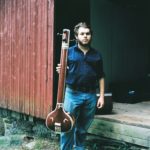 His new “Fruit” may hang low, but Jewish folk singer /songwriter Jesse Rifkin should certainly feel proud enough to hold his head high.
His new “Fruit” may hang low, but Jewish folk singer /songwriter Jesse Rifkin should certainly feel proud enough to hold his head high.
Known mostly to his fans as The Wailing Wall, calling his new LP, The Low Hanging Fruit (which JDub Records generously provided us an advanced copy of, before it arrives in stores, June 8th, priced around $12.50), anything less than a triumph, with its crystalline, soulful lyrics, spirituality, and just plain trippy soundscapes, would be committing a great disservice to this gifted, 20-something talent.
While his nasal voice may take a little getting use to—think a cross between Dylan and Cat Stevens and you’ll get the idea—after having listened to his sometimes-dark, moody, and brooding album twice, I have to concur with m’lady: the artist’s songs, filled with hooks, chants, and exotic, unlikely instruments, are irresistible.
Not to mention the fact that the underlying themes of his songs, ranging from the idea of facing one’s own darkness, to keeping the faith in an ever-changing world, are positively universal among listeners, Jewish or gentile.
Fruit’s first track, “Speak Not His Name,” opens quietly enough, with Rifkin’s soft-spoken chanting: “And I know there is light in each crack, in each corner/but I cling to the darkness forever mourner/And when light comes to find me, I will run to avoid it.”
The song itself builds to a lively, chills- and goosebump-inducing drum-filled chorus, resembling that of a Native American tribal beat.
It leaves you as hypnotized as it does breathless.
After the track was over, my wife and I just looked at each other in awe; sort of one of those holy shit!! looks, where one realizes that they’re onto something truly special.
“Bones Become Rainbows,” switches gears with chipper clapping and happy-happy finger cymbals. Giving it a hint of exoticism is Colin White’s energetic sitar work.
Nearly midway through, Rifkin pulled the rug right out from under me, with a whisky-soaked, straight-up rock song, titled “Dandelion,” one might be more likely to hear in a smoky, raucous Irish pub. Once my wife helped me get my (proudly, self-claimed) “ghetto booty” off the floor and, of course, make me fix the disheveled rug, I was able to do a little jig that many (read: most) would liken to Chunk’s “truffle shuffle,” from “The Goonies,”
The same goes for “Fear No Apple, Fear No Flood,” a slow-burning ditty that one might confuse with an Irish bar tune, thanks to some great pipe organ, trumpet, and harmonium work by Ben Bernstein, Ian Staub, and Rifkin himself, respectively. While I will freely admit to asking the wife if she had changed CDs, to put on The Chieftains, while I was in another room (she had not, of course), it just goes to show that certain instruments need not be, nor should be associated with one genré, style, or nationality of music.
Did anyone just hear the tune to those NBC “The More You Know” P.S.A. commercials, or was that just me?
Yeah, I figured so.
Fruit’s strangest track is a 27-second number, simply titled “( ),” (wow! How very Sigur Ros of you, Mr. Rifkin!) which consists of one lone singing saw. I haven’t heard of a gutsy move like that since Sarah McLachlan closed her 1995 Surfacing album, using that same instrument, with “Last Dance.” But at least she had a piano, playing in the background. It’s an odd, disarming sound that can be beautiful (“Dance”) or, well, grating ( “( )” ).
To be fair, “( )” provides a lead-in for a deep, meaningful, and, most of all, wise closer, “Hands and Teeth,” about G-d’s hand, and our flawed, numbered, day-to-day, actions, but come on! A singing saw for 27 seconds, with absolutely zilch, in the way of melody? Why not just make that part of the closer? It’s just a waste of space on an otherwise terrific LP (apparently, music execs and producers, when they’re not snorting the “nose candy,” are OCD-addled, anal-retentive dingbats that need—NEED!—round, even numbers! To this, I ask, if David Bowie could get away with it on Station to Station, then why can’t Mr. Wailing Wall?)
And, ya know, something tells me that The Wailing Wall, Mr, Rifkin himself, had another song in him that could have easily occupied track number nine on this gifted singer/songwriter’s bravura new album.
But as usual, there’s always next time.
And if The Low Hanging Fruit is any indication of what to expect from Jesse Rifkin, then that ninth track will be very much indeed worth the wait.




An acapella singing saw can actually sound good (if you get a good saw player). I’ve heard one at last year’s NYC Musical Saw Festival (http://www.MusicalSawFestival.org ). Jesse Rifkin might want to attend the festival (August 7th), since it’s in his home town – they have a workshop.